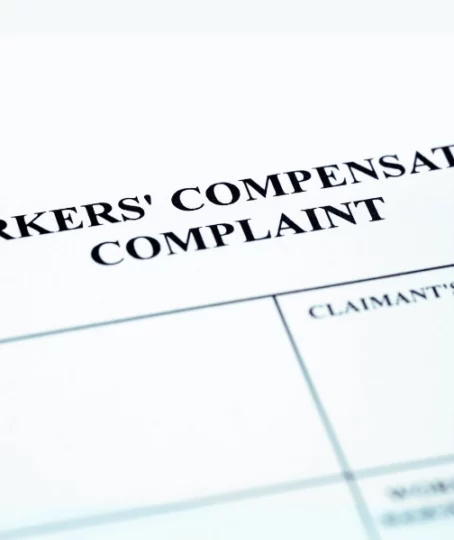
A construction worker was injured in a Peoria County construction zone after a delivery van crossed into a closed lane...


If you’ve been injured on the job and your employer refuses to file your workers’ compensation claim, you may feel frustrated, confused, and unsure of your rights. Workers’ compensation is a legal benefit designed to protect employees who suffer workplace injuries, and employers are required by law to comply with the process. When they fail to do so, it can delay your access to medical care and wage replacement. Understanding what steps to take in this situation is crucial.
If your employer is refusing to file your workers’ compensation claim, contact Strong Law Offices for help. 309-393-2928.

While most employers understand their legal obligation to report workplace injuries and file workers’ compensation claims, some choose to avoid the process. Unfortunately, when an employer refuses to file a claim, it can place the injured worker in a difficult position—delaying access to medical care, wage benefits, and overall recovery. Understanding why some employers may take this route can help injured workers recognize red flags and take appropriate action.
One of the most common reasons employers refuse to file workers’ comp claims is the fear of increased insurance premiums. Just like auto insurance, workers’ compensation insurance rates can rise after a claim is filed, especially if the incident reveals a pattern of safety issues or negligence. To keep costs low, some employers try to discourage or outright block claims from being reported. In their minds, avoiding a claim is a way to save money—but it comes at the expense of the injured employee’s well-being and legal rights.
Employers may worry about the reputational impact of workers’ compensation claims, especially if the company already has a record of workplace injuries. Repeated claims may raise concerns from clients, investors, or regulatory agencies. As a result, some employers might refuse to file a claim in an attempt to keep their safety record clean. They may pressure workers to say the injury happened outside of work or ask them to “tough it out” rather than report it.
In some cases, refusal to file a claim isn’t driven by malice but by ignorance. Small business owners, in particular, may be unfamiliar with the workers’ compensation process or mistakenly believe that certain types of injuries aren’t covered. For example, they may think that injuries resulting from repetitive stress or cumulative trauma don’t qualify. However, these injuries are often covered under workers’ comp, and an employer’s misunderstanding doesn’t absolve them of their responsibilities.
Some employers try to avoid responsibility by misclassifying employees as independent contractors. Independent contractors are typically not eligible for workers’ comp benefits, so by labeling a worker incorrectly, an employer may think they’re not obligated to file a claim. However, this practice is illegal, and many misclassified workers are actually entitled to benefits under the law. Courts and labor boards often scrutinize these classifications closely in the event of a dispute.
While rare, some employers worry about fraudulent claims and may assume that an employee is exaggerating or faking an injury to receive benefits. Instead of following proper procedures and allowing the insurance company to investigate, they may refuse to file the claim altogether. However, workers' comp insurers have their own investigation processes designed to detect fraud, and it's not the employer’s role to make that determination.
In worst-case scenarios, an employer may try to retaliate against a worker for reporting an injury, especially if the claim could expose unsafe practices or lead to penalties from OSHA or other regulatory agencies. Refusing to file a claim as a form of punishment or intimidation is illegal and could lead to serious legal consequences for the employer.
Employers may refuse to file workers’ comp claims for financial, reputational, or legal reasons—some rooted in ignorance, others in deliberate misconduct. Regardless of the reason, this refusal violates workers’ rights and can be challenged with legal support.
If you’ve suffered a workplace injury and your employer refuses to file your workers’ compensation claim, it’s important to know that you are not out of options. Workers' compensation laws are designed to protect employees, and there are legal steps you can take to ensure your rights are upheld—even when your employer fails to act.
In many states, including Illinois, injured workers have the right to file a workers’ compensation claim directly with the state’s workers' compensation commission or board. You do not need your employer's permission or participation to initiate the process. Each state has a workers’ compensation agency where you can submit the appropriate forms, report the injury, and start your claim. Be sure to keep detailed records of your injury, including medical reports, witness statements, and communication with your employer, to support your case.
If your employer is actively refusing to cooperate or has not provided the required forms, you can contact your state’s workers’ compensation agency to report the issue. In Illinois, for example, you can reach out to the Illinois Workers’ Compensation Commission (IWCC). These agencies exist to ensure that both employees and employers comply with the law, and they may investigate the employer’s refusal to report your injury. This step may also protect you from missing important deadlines, such as the statute of limitations for filing a claim.
A workers’ compensation attorney can be one of your most powerful resources in situations like this. If your employer refuses to file your claim, a lawyer can help you understand your rights, gather necessary documentation, and file your claim directly. They can also communicate with your employer and the insurance company on your behalf and represent you in hearings or appeals if your claim is contested.
An attorney can also help you determine if other legal violations have occurred. For example, if your employer retaliated against you for reporting your injury—such as firing you, cutting your hours, or threatening you—this may be grounds for a separate legal claim. Retaliation is illegal under both federal and state laws, and you may be entitled to additional compensation.
In some cases, refusing to file a workers' comp claim may be part of a broader pattern of employer misconduct. Employers are legally required to carry workers’ compensation insurance (with limited exceptions), and willful noncompliance can result in fines, penalties, or criminal charges. If you believe your employer does not have proper insurance or is violating labor laws, you can report them to your state’s Department of Labor or equivalent authority.
If your employer’s refusal to file a claim leads to delays in treatment or financial hardship, you may be able to pursue a civil lawsuit in certain situations. This is especially relevant if the employer was grossly negligent or intentionally interfered with your right to receive benefits. While workers’ comp laws usually prevent lawsuits against employers, there are exceptions, and an attorney can help determine if your case qualifies.
If your employer refuses to file your workers’ compensation claim, you are not powerless. You can take control by filing the claim yourself, seeking help from the appropriate state agency, hiring a workers’ comp attorney, and exploring all legal remedies available.
It is illegal for your employer to fire you for filing a workers' compensation claim—even if you do so without their help. Workers’ compensation laws are designed to protect employees who suffer job-related injuries or illnesses, and those protections include safeguarding against retaliation.
Retaliation can take many forms, including termination, demotion, reduced hours, or hostile treatment in the workplace. If you are hurt on the job and your employer refuses to file a claim, you are within your rights to file it directly with your state’s workers’ compensation board or commission. Doing so is a lawful act, and taking that step should not be held against you.
If your employer does fire you after you file a claim, that could be considered wrongful termination or retaliatory discharge—both of which are illegal in most states, including Illinois. In such cases, you may be entitled not only to workers' compensation benefits, but also additional damages through a separate legal claim against your employer.
To protect yourself, keep records of all communication related to your injury and your workers’ comp claim. Save emails, texts, and notes from any conversations you have with your employer about your injury or job status.
If you suspect you’ve been retaliated against for asserting your legal rights, contact a workers’ compensation attorney or an employment law specialist. They can help you understand your rights, file the appropriate complaints, and take legal action if necessary.
If you've been injured on the job and your employer is uncooperative—whether they delay, deny, or outright refuse to help with your workers’ compensation claim—it’s critical to take steps to protect your legal rights. Workers’ compensation is a system designed to support injured employees, but when your employer doesn’t follow the rules, you must be proactive to ensure you receive the benefits and protections you’re entitled to under the law.
The first and most important step is to document everything related to your injury and your interactions with your employer. Keep a detailed record of:
Having a paper trail is crucial if you need to file your claim without your employer’s help or if you end up in a legal dispute.
In most states, including Illinois, you do not need your employer’s permission or involvement to file a workers’ compensation claim. If your employer refuses to provide the necessary forms or report your injury, you can go directly to your state’s workers’ compensation board or commission to file the claim yourself. Be sure to check your state’s deadlines—missing the statute of limitations could jeopardize your claim.
Your health comes first. Seek medical attention as soon as possible, even if your employer tries to downplay the severity of your injury or insists you don’t need treatment. Inform the medical provider that your injury is work-related so they can document it accordingly. This documentation will serve as key evidence in your workers’ compensation case.
If your employer is uncooperative, contacting a workers’ compensation attorney can be a smart move. An attorney will explain your rights, help you file your claim properly, and deal with your employer or their insurance company on your behalf. They can also identify whether your employer’s actions—such as denying your injury occurred or retaliating against you—violate state labor laws.
Employers are legally required to cooperate in the workers’ compensation process. If your employer is breaking the law—by refusing to report your injury, lacking workers’ compensation insurance, or retaliating against you—you can report them to your state’s labor department or workers’ compensation agency. These agencies can investigate and, if necessary, penalize the employer.
If your employer is creating a hostile or uncomfortable work environment after your injury, don’t resign without speaking to an attorney first. Quitting could affect your ability to receive benefits or pursue legal action for retaliation. An experienced lawyer can help you weigh your options and protect your long-term interests.
Facing an uncooperative employer after a workplace injury can be intimidating, but you have legal rights—and resources—to help you navigate the situation. By documenting everything, seeking medical attention, filing your claim independently, and getting legal support from Strong Law Offices in Bloomington, you can stand up for yourself and secure the benefits you need.

A construction worker was injured in a Peoria County construction zone after a delivery van crossed into a closed lane...

Your Duty to Report a Work Injury in Illinois Under the Illinois Workers’ Compensation Act, injured employees must notify their...

What Factors Determine Your Average Weekly Wage in Illinois Workers’ Compensation? Besides covering your medical bills, workers’ comp gives you...